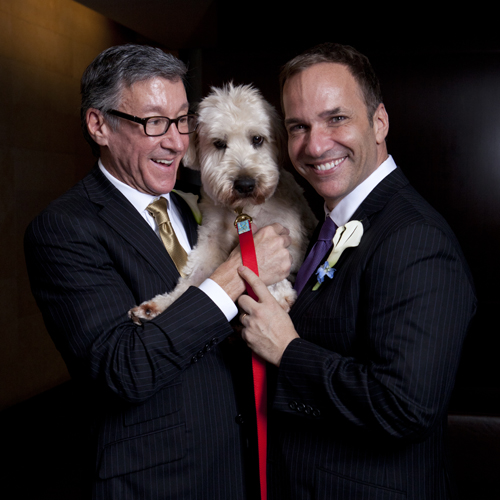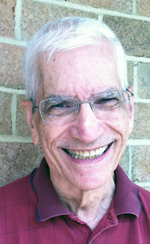
By Joel H. Cohen

NEW YORK –On that memorable Sunday afternoon, the atmosphere was especially warm and congenial, the vibes loving in the Manhattan apartment that our middle son shared with the long-time love of his life, whom he was about to marry.
Close friends and favorite relatives had gathered for the ceremony. A wedding canopy (the traditional chuppah) had been erected. There would be the traditional seven blessings recited by persons near and dear to the couple and the traditional breaking of a glass, to commemorate the destruction of the ancient Temple in Jerusalem.
The event’s happy mood and particulars mirrored so many other weddings we’d attended, with one notable difference: Both parties getting married were men.
Our son and his partner, both gay, and both of whom we loved unconditionally, had been together for 24 years. The culminating event of their relationship — the wedding — was both testament to their mutual love and an acknowledgment that they could marry legally in New York state and thus be eligible for any and all of the law’s benefits.
The third of our four children, he’d “come out” to us decades before, in 1985, on a car ride to a cousin’s house in New Jersey. He and my wife were discussing a TV show they’d seen and been moved by (“An Early Frost,” about a young lawyer who, having been diagnosed with AIDS — a death sentence in those days — must at last tell his parents about his homosexuality).
Our son, who was then 24, said, almost casually, “You know, I’m in an at-risk population.” Not taking him seriously, I said, “Oh, are you Haitian?” which, at the time, was the population, beside gays, believed to be jeopardized by AIDS. And then he revealed the secret he’d kept for years.
For his mother and me, both of whom long before had been advocates of gay rights, the announcement was a jolt, intensified by the fact that his looks and personality made him a surefire romantic attraction to girls and young women. “He must beat them off with a stick,” a friend of ours used to say.
Not that that we’d ever been looking for signs, but there were strong evidences of heterosexuality … for instance, the elementary school Valentine’s Day party attended only by girls. “Where are the boys?” we asked. “They couldn’t come,” he told his mother. “I forgot to ask them,” he told me.
And, from college, he reported that a girl he’d been asking out had finally agreed to a date. In our ensuing light-hearted conversation, he joked that his generation’s “getting to first base” was probably my generation’s “home run.”
In response to his coming-out announcement, we told him — and, of course, meant it — that we loved him the same, that he was the same person as always.
In private, we agonized a bit over what we might have done that we shouldn’t have, or not done that we should have, to contribute to his “condition.” But it wasn’t long before we realized that homosexuality isn’t something learned or acquired or inspired. It just is.
He’d come out to his sister, the eldest of our four children, years before. He told his older brother’s wife, then his older brother and ultimately his younger brothers and us, his parents — all of us supportive. And with that, the mighty weight was off his shoulders. He seemed happier than we’d seen him in years.
And then we “came out,” attending a Carnegie Hall concert of the Gay Men’s Chorus, in which our son participated. Not that we intended to send out announcements of his pronouncement, but we told friends and relatives — selectively — sharing the news at first with those we calculated would not be judgmental, at least outwardly.
The wedding was the natural outcome of the couple’s coming-out and their long-term relationship.
Did the marriage of our son and his partner threaten our marriage? If anything, their intense commitment strengthened ours (then going on 60 years). And I suspect it did the same for the marriages of each of his brothers. It certainly didn’t threaten them.
Our new son-in-law is a beloved member of our family, as our son was with his partner’s late parents.
Some cite inability to procreate as a (flawed) reason to oppose gay marriage. Should our gay couple ever decide to adopt, they’d most probably be excellent parents — although a bit permissive, which isn’t necessarily a sin.
But that’s something for the future, if at all. On that Sunday two years ago, months after gay marriage became legal in New York, we were in the moment.
There were jokes (“it’s surely not a shotgun wedding”), shouts of “mazel tov” from guests of different ethnicities and orientations, gentle roasts, and sincere sung and spoken toasts, including a heartfelt tribute from our new son-in-law to his mother, who was unable to attend because of illness. His proud father sat under the canopy, as did we, during the ceremony.
The atmosphere at the wedding was especially gay, in the original meaning of the word, and very right.
*
Cohen is an author and freelance writer who lives on New York City’s Staten Island. This article appeared previously in the Baltimore Sun and is reprinted with permission. Comments intended for publication in the space below MUST be accompanied by the letter writer’s first and last name and by his/ her city and state of residence (city and country for those outside the United States.)
Mazel tov to your son and his supportive family. I had a niece “come out six years ago and am pleased to say my family reacted with the same love and class yours did. Though I was surprised there was never a question in our family that the young lady continued to be the same girl we all loved. As usual, my younger son, her cousin, was aware way before we ‘older generation’ were. My thought is love is the most important emotion to remember when confronted with these situations and to remember the one “coming out” needed to do so. While one may be shocked, to withdraw one’s love will not change anything and is one of the most hurtful and pointless reactions one can have.
–Ed Karesky, Escondido, California